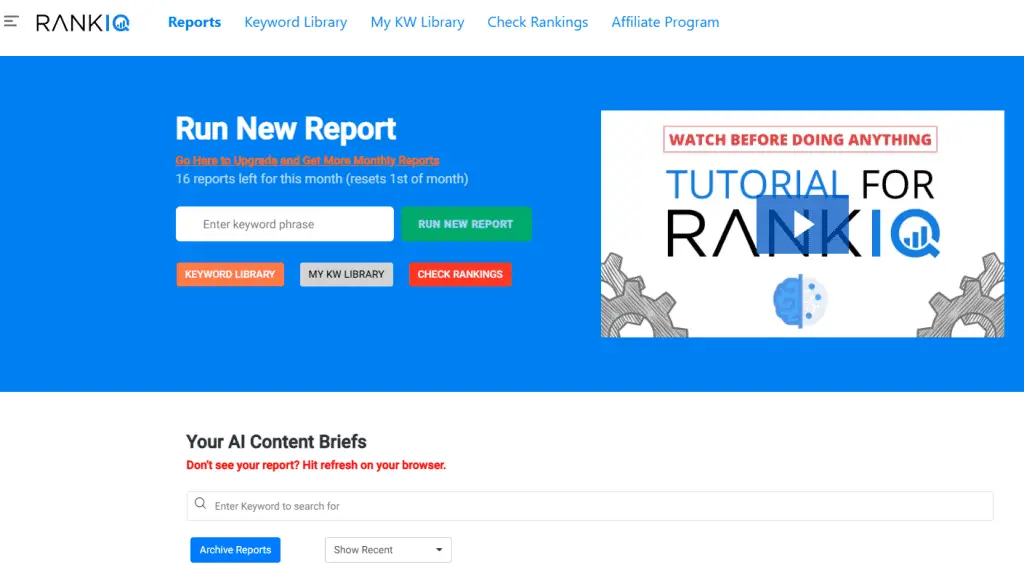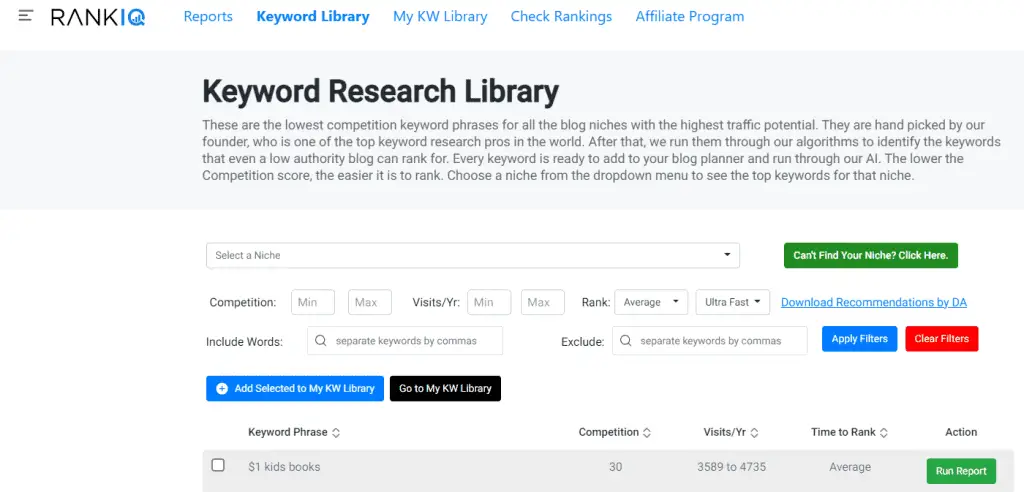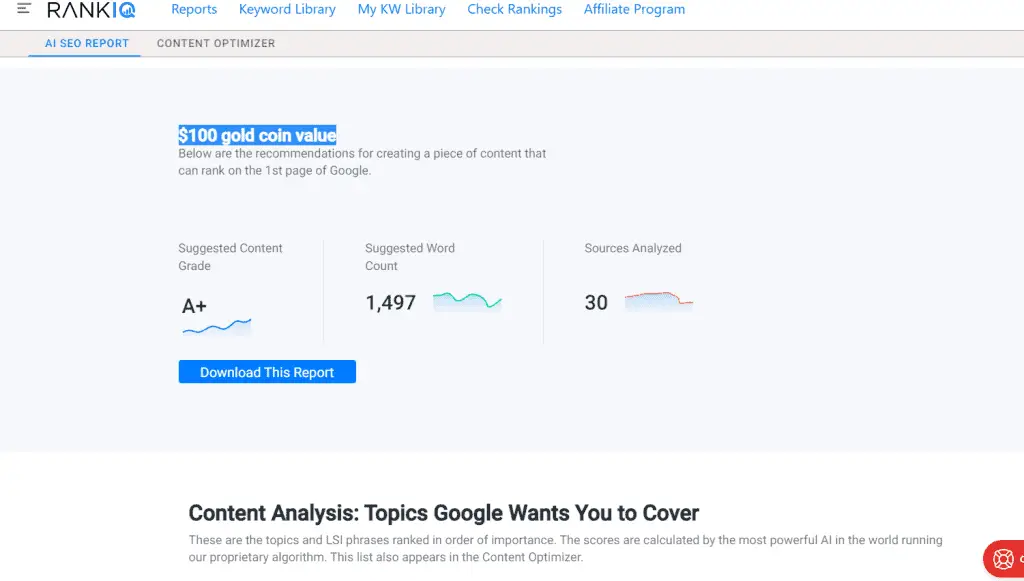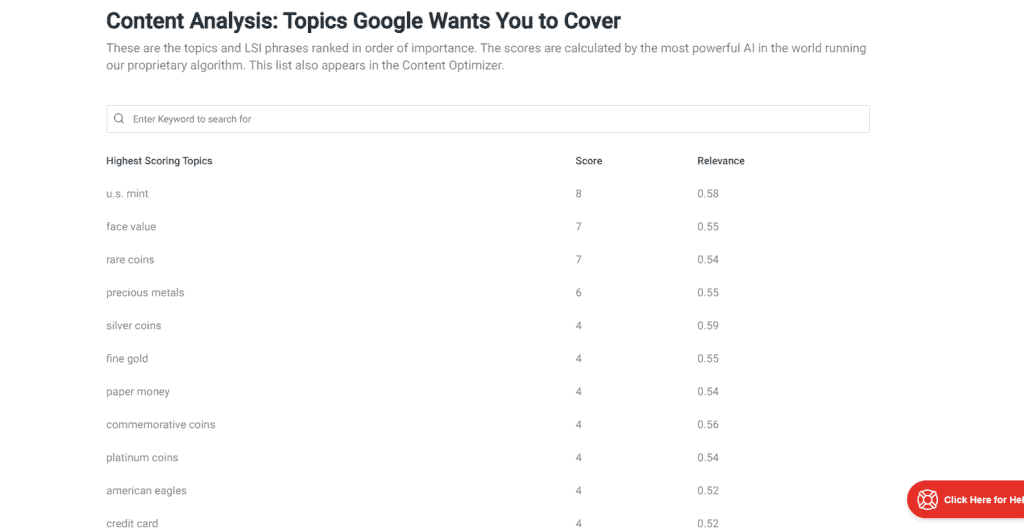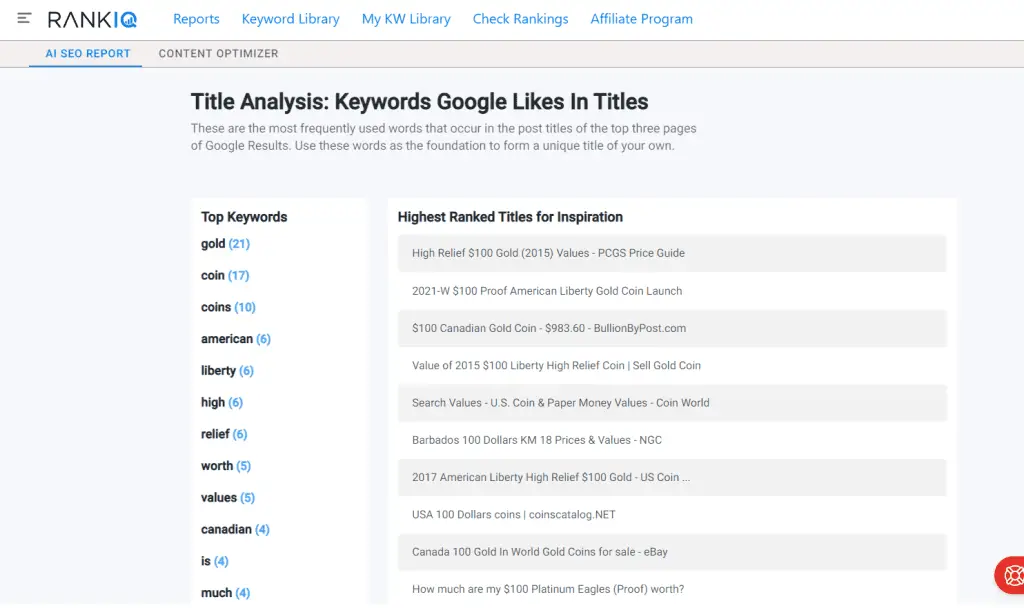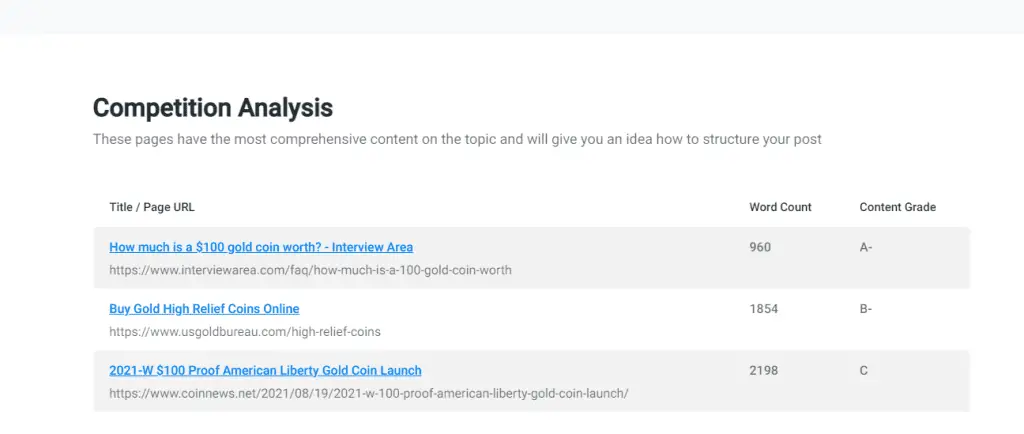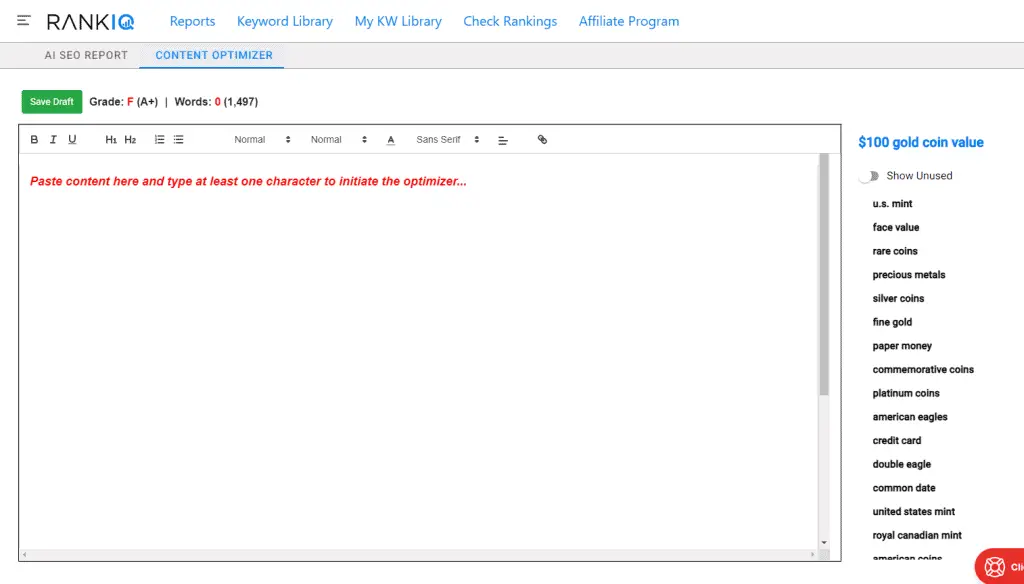If you can believe it, you can do this without creating backlinks. Once in a while, a helpful SEO tool for optimizing content appears, and it can save you a lot of time and money. Let me introduce you to Brandon Gaille’s RankIQ.
What is RankIQ?
RankIQ represents an SEO platform for keyword analytics where writers and bloggers can find low-competition keywords to rank fast in google searches. The platform is designed to reduce your time for keyword analysis. Brandon Gaille’s RankIQ offers a massive list of keywords where you can find fast-time ranking keywords with high volume. All keywords are generated manually.
What is RankIQ’s price?
RankIQ’s price is $50 monthly. The payment method is a credit or debit card.
RankIQ’s Advantages
- Thousands of niche-specific, low-opposition keywords are offered to you.
- The current popular material is used to suggest keywords for title creation.
- Straightforward and simple to use.
RankIQ’s Disadvantages
- Only 16 reports per month.
- Only 16 times per month can you use SEO content and AI optimizer for your text.
- There is no Chrome extension.
My point of view
When I purchased RankIQ for one month, I got this first platform page:
The most important part of this platform is the Keyword Library. Here, you can find keyword analysis and low-competition keywords that can rank faster than others:
RankIQ niche industries
- Wedding
- Trucking
- Travel
- Survival
- Sports
- Special Education
- Songs
- Solar Panels
- Remote Working
- Relationships
- Real Estate
- Project Management
- Programming
- Podcasting
- Photography
- Personal Finance
- Outdoors
- Organization Ideas
- Nutrition
- Notary
- Non-Toxic / Eco Friendly
- Music
- Mom
- Mindset/Mindfulness
- Mental Health
- Medical School
- Insurance
- Immigration / Citizenship
- Hunting/Guns
- HR / Workplace
- Horses
- Homesteading / Composting
- Homeschool
- Health
- Graphic Design
- Gardening
- Gaming
- Funny
- Frugal Living
- Forklift
- Food
- Fitness
- Fishing
- Financial Crimes / Scams
- Fashion/Makeup
- Facts About
- Electric Rides
- Dogs/Cats
- DJ
- DIY
- Disney/Theme parks
- Decor
- Cybersecurity
- Computers
- Cigar
- Christian
- Career / Jobs
- Telescopes / Binoculars
- Business
- Books
- Blogging
- Beekeeping
- Automobile
- Arts/Crafts
- Anime
As you can see in SemRush, you can see competition level, visits, and time to rank information. Time to rank is a unique feature where RankIQ estimates the speed degree to rank.
RankIQ seems to be founded on what I’ve heard thus far. I’ve been keeping up with Branon Gaille via his blog and podcast for a while. He has widespread esteem among other bloggers. The software is user-friendly and affordable enough for newbie bloggers who may not have access to more advanced tools like ClearScope, MarketMuse, SurferSEO, or POP. A reasonably extensive trial would be needed to see how these tools fare against one another.
These professionals are often found deep in the weeds, testing out new strategies to boost the Google rankings of their own or their customers’ websites. Spencer Haws’s Link Whisper WordPress plugin, Kyle Roof’s PageOptimizer Pro (POP), and now Brandon Gaille’s new AI-based SEO solution are all excellent examples.
If you came into this review, you’re probably debating whether or not to invest in Rank IQ. Let me spare you the trouble of reading to the conclusion by confirming that your time spent will not be wasted. Why? In any case, I suppose you’ll have to keep reading as we delve in to learn more about this new AI-powered SEO toolkit from Brandon Gaille.
AI-powered RankIQ enhances Google ranks via SEO. RankIQ advises a particular number of words, a title, and keywords appearing on Google’s first page. RankIQ helps internet publishers, and bloggers get top SERPs. Brandon Gaille discovered that few content providers’ websites showed on Google’s full page for their keywords.
Practical Example Case Study
Let us present one case study in RankIQ.
First, I will type “$100 gold coin value” and make a report. After 1 minute, I will get this:
Brandon considers RankIQ a “market-disrupting instrument.” SEO exploration gear uses IBM Watson AI. Their AI can answer 6,000 math problems in 2 minutes. The consequences outline precise steps you may take to boost your post’s Google ranks. We must wait for field testing findings to verify this instrument’s long-term utility.
Bloggers, content producers, originators, and any person who writes for the web and desires to do well in Google search results are the intended users of the program. It’s made for all levels of bloggers, from novices to seasoned veterans. You may use the program to optimize new and existing content to increase the volume of organic views.
Let’s go to work; enough chatter. Rankin’s UI is easy to use. There is a login screen. The right-hand video may interest you. Brandon created a 26-minute welcome video for new users.
The step-by-step instructions are easy to follow.
The keyword analysis process is as follows:
- Examine each niche keyword independently. RankIQ wasn’t meant for keyword research like SEMRush.
- Create a search word library.
- Schedule publication (grounded on particular keywords).
- Run AI SEO before writing. This helps the AI deliver the most current and relevant data for analysis.
It’s a first for an SEO/SERP tool. I was surprised. Brandon’s method includes keywords with low competition for more than 60 blogging categories. This is a goldmine for bloggers who haven’t mastered keyword research. They’ll save a lot of time. (They must acquire keyword research; it’s essential for bloggers.)
If they choose their keywords carefully, they’ll climb the SERPs if their website is brand-new and lacks specialty authority. RankIQ has analyzed low-opposition keywords.
In the next step, we will see the topic that you need to cover in your article:
Article title analysis in RankIQ:
Finally, the RankIQ competition analysis section where you can find the best articles written by your competition:
Finally, there is a section where you can scan your article:
The Content Grade Optimizer appears in the following section of the report. A WYSIWYG editor is used for this purpose. The content quality mark and word count will dynamically update as you write and revise your draught.
You’ll see a list of suggested subtopics on the page’s right side, each of which will help you create more comprehensive material for your selected term. Please excuse my dull writing; I was trying out some new features and keeping an eye on the progress of the green ticks in real-time.
Once you have completed your post and have received the desired quality grade and the number of words, it will be arranged for publication. Brandon asserts that this is the moment at which RankIQ will have aided in creating the most thorough material on the subject in question, complete with a CTR-optimized page title.
In addition to having content that performs well for your primary keyword, you’ll also have material that should do well for all of the subordinate phrases and keywords relevant to the issue.
Even if I don’t use link-building on my specialty websites, I still believe the anticipated ranking timeframes are reasonable (around six months for “average”). Switching between two tabs is possible after a report has been generated for a specific keyword or set of keywords.
Because of the many algorithms it runs in the contextual and real-time data analysis it pulls from the best 30 currently ranking sites, this report may take up to 2 minutes to generate. It took roughly 30 seconds for the queries I did.
When complete, the report is displayed in a sleek and professional layout. There are four parts to the information:
- Time to rank
This section only demonstrates the minimum word length and content value mark for a blog post or editorial to have a fighting chance of ranking on Google’s first page for a particular keyword.
- Google’s Top-Rated Content in a Competitive Analysis
Associates to the three blog entries with the most in-depth coverage of the term in question may be found in this report section. The point is to check the top three posts to see how they’ve laid up their information and presented their arguments.
Pay close attention to whether or not the content matches the term’s intended meaning.
- Keyword Research for Titles That Rank Well in Google
One keyword research method is “Title Analysis,” which involves Looking for relevant phrases in the top three webpage names. This section analyses Google’s top 30 results for the desired search term.
The quality of a blog post’s title affects CTR. RankIQ helps construct the best page heading by collecting keywords from sites ranking for a specific search. This feature is excellent since it streamlines the SEO process, which may be cumbersome with other programs. You will be given a list of recommended subjects to cover in the main body of the material. The IBM-powered AI program takes care of this on its own.
The subjects are structured, so you can easily use them as the basis for an article plan. The time savings from this method are substantial. Manually analyzing Google’s SERPs might take a lot of time if you don’t use this tool. Within minutes, RankIQ’s AI takes care of this.
The top 40 should be grouped under a common subject for the post framework. You will consolidate the top forty ideas into an overarching concept for inclusion in the post framework.
The top 40 should be grouped under a single subject for inclusion in the post outline. Keywords relating to variations that are crucial to discuss will be included on the list.
The top 40 should also be grouped under a single subject for inclusion in the post framework. Long-tail search-engine optimization keywords: If you want to rank for several ancillary keywords, you should include them in the content.
The following is Brandon’s suggested process for completing this part of the report:
- Classify the top 40 subjects under a single umbrella.
- The second step is discovering how those key themes may be expressed differently.
- The next stage is to locate the LSI keywords. In his video Welcome to the Team,
- Brandon Gaille warns his new hires that keyword stuffing is a bad idea.
The Preferred Method of Composing for Rankings
Make an excellent outline first.
Create a long, detailed article.
Third, increase your content quality by including more that reads organically.
Top-Rated Functions of RankIQ
Brandon is the first to confess that he had to start from square one when he created his blog. In 1.5 years, he went from having a few articles and little traffic to having over a million monthly visitors. There has been a remarkable increase in visitors. His three blogs have over 53,000 first-page ranks, resulting in above 50,000,000 yearly organic search traffic. His most well-known blogs are The Blog Millionaire and brandongaille.com, though it is not normal for bloggers to disclose all their sites.
Brandon has been transparent about the arduous ordeal he has been through for the better part of a time. Their reversal is miraculous, and they have my sincerest best wishes for the future of their SEO software company.
Conclusion
RankIQ is an SEO tool platform for people who want to save time in keyword analysis. SemRush and manual keyword analysis are better ways to get the best quality articles and keyword analysis. However, if you want to find fast-ranking keywords in your niche without much effort, RankIQ is perfect for you.
- 6 Proven Ways SaaS Founders Actually Get Customers (With Real Examples) - December 17, 2025
- Facebook Ads to Get Followers! - December 27, 2024
- ClickUp vs. Slack - December 20, 2024





